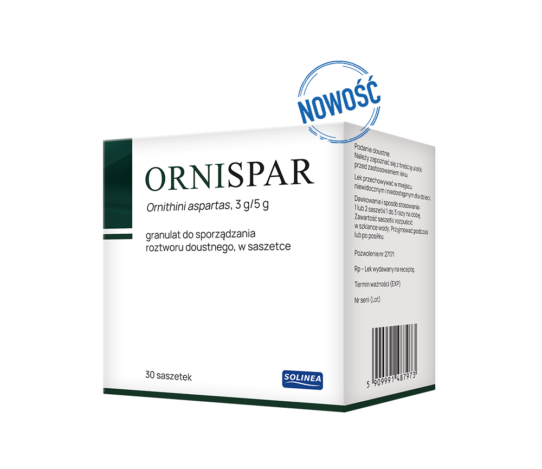

Ornispar

Ask a doctor about a prescription for Ornispar

How to use Ornispar
Leaflet attached to the packaging: Patient information
Ornispar, 6 g/10 g, granules for oral solution, in a sachet
Ornithine aspartate
Read the leaflet carefully before taking the medicine, as it contains important information for the patient.
- Keep this leaflet, so you can read it again if you need to.
- If you have any doubts, consult your doctor or pharmacist.
- This medicine has been prescribed to you by a doctor. Do not pass it on to others. The medicine may harm another person, even if their symptoms are the same as yours.
- If the patient experiences any side effects, including any side effects not listed in this leaflet, they should inform their doctor or pharmacist. See section 4.
Table of contents of the leaflet:
- 1. What is Ornispar and what is it used for
- 2. Important information before taking Ornispar
- 3. How to take Ornispar
- 4. Possible side effects
- 5. How to store Ornispar
- 6. Contents of the packaging and other information
1. WHAT IS ORNISPAR AND WHAT IS IT USED FOR
Ornispar is used to treat latent and overt hepatic encephalopathy occurring in the course of chronic liver diseases, such as chronic hepatitis, liver cirrhosis.
2. IMPORTANT INFORMATION BEFORE TAKING ORNISPAR
When not to take Ornispar
Do not take Ornispar if you have the following disorders:
- hypersensitivity to L-ornithine L-aspartate or any of the other ingredients of the medicine;
- severe kidney failure (serum creatinine level above 3 mg/100 ml);
- disorders of amino acid metabolism involved in the urea cycle, e.g. due to enzymatic defects;
- fructose intolerance.
Warnings and precautions
Ornispar contains 720 mg of sorbitol in 1 sachet. Sorbitol is a source of fructose. If you have previously been diagnosed with intolerance to some sugars or have been diagnosed with hereditary fructose intolerance, a rare genetic disease in which the patient's body does not break down fructose, you should consult your doctor before taking the medicine.
Ornispar contains isomalt. If you have previously been diagnosed with intolerance to some sugars, you should consult your doctor before taking the medicine.
Ornispar contains 1% propylene glycol.
Before administering the medicine to a child under 4 weeks, consult your doctor or pharmacist, especially if the child is taking other medicines containing propylene glycol or alcohol.
Long-term use of Ornispar may cause tooth decay.
Children:
There is no data on the use of the medicine in children.
Before administering the medicine to infants or children, you must consult your doctor, as there is a possibility of undiagnosed fructose intolerance in the child.
Ornispar and other medicines
Tell your doctor about all the medicines you are taking or have recently taken, as well as any medicines you plan to take.
There are no known interactions between Ornispar and other medicines.
Pregnancy and breastfeeding
If you are pregnant or breastfeeding, think you may be pregnant, or plan to have a child, consult your doctor before taking this medicine.
Pregnancy:
There are insufficient studies on the safety of using Ornispar during pregnancy, so you should avoid taking the medicine during pregnancy. Ornispar may be taken by pregnant women only if recommended by a doctor.
Breastfeeding:
It is not known whether L-ornithine L-aspartate (the active substance of Ornispar) passes into breast milk. You should avoid taking the medicine during breastfeeding.
Ornispar may be taken by breastfeeding women only if recommended by a doctor.
Driving and operating machinery
The ability to drive vehicles and operate machinery may be impaired due to the disease being treated with Ornispar.
Ornispar contains sorbitol, isomalt, and propylene glycol.
See the "Warnings and precautions" section.
3. HOW TO TAKE ORNISPAR
Always take this medicine exactly as your doctor has told you. If you are not sure, consult your doctor or pharmacist.
The usual dose is 1 sachet 3 times a day.
The contents of the sachet should be dissolved in a glass of water. Take during or after a meal.
If you feel that the effect of the medicine is too strong or too weak, consult your doctor or pharmacist.
Method of administration
Oral administration.
Overdose of Ornispar
No symptoms of overdose have been observed with Ornispar so far.
In case of overdose, symptomatic treatment is used.
Missed dose of Ornispar
Take the next dose at the right time, according to the dosing instructions. Do not take a double dose to make up for a missed dose. If you have any doubts about taking the medicine, consult your doctor or pharmacist.
4. POSSIBLE SIDE EFFECTS
Like all medicines, Ornispar can cause side effects, although not everybody gets them.
Uncommon side effects (less than 1 in 100 people):
nausea; vomiting; stomach pain; bloating; diarrhea.
Rare side effects (less than 1 in 10,000 people):
limb pain.
The listed side effects are usually temporary and do not require discontinuation of the medicine.
Reporting side effects
If you experience any side effects, including any side effects not listed in this leaflet, tell your doctor, pharmacist, or nurse. Side effects can be reported directly to the Department of Monitoring of Adverse Reactions to Medicinal Products of the Office for Registration of Medicinal Products, Medical Devices, and Biocidal Products,
Aleje Jerozolimskie 181C
02-222 Warsaw
tel.: +48 22 49 21 301,
fax: +48 22 49 21 309
website: https://smz.ezdrowie.gov.pl
Side effects can also be reported to the marketing authorization holder.
Reporting side effects will help to gather more information on the safety of the medicine.
5. HOW TO STORE ORNISPAR
Keep out of sight and reach of children.
There are no special precautions for storing the medicine.
Do not use the medicine after the expiry date stated on the carton. The expiry date refers to the last day of the month.
Medicines should not be disposed of via wastewater or household waste. Ask your pharmacist how to dispose of medicines that are no longer needed. This will help protect the environment.
6. CONTENTS OF THE PACKAGING AND OTHER INFORMATION
What Ornispar contains
The active substance of the medicine is L-ornithine L-aspartate.
1 sachet (10 g granules) contains 6 g of L-ornithine L-aspartate.
Excipients:
citric acid, sorbitol, ananas flavor (flavor enhancers, corn waxy maltodextrin, modified corn waxy starch), sucralose (E 955),
silica colloidal anhydrous, peppermint flavor (natural menthol, peppermint oil Mentha piperita L., spearmint oil Mentha spicata L.,
maltodextrin, arabic gum, propylene glycol), sodium riboflavin phosphate (E 101), isomalt.
What Ornispar looks like and what the pack contains
Ornispar is white or slightly yellow granules.
Packaging: 10, 20, 30, 50, or 100 sachets of 4-layer laminate (paper/PE/aluminum/Surlyn) or sachets of 5-layer laminate (paper/polyurethane solvent-based two-component/aluminum/polyurethane solvent-based two-component/LDPE) in a cardboard box.
Not all pack sizes may be marketed.
Marketing authorization holder:
Solinea Sp. z o.o.
Elizówka, ul. Szafranowa 6
21-003 Ciecierzyn
Poland
tel.: +48 81 463 48 82
[Solinea logo ]
Manufacturer:
Mako Pharma Sp. z o.o.
Kolejowa 231A
05-092 Dziekanów Polski
Medicofarma S.A.
ul. Tarnobrzeska 13
26-613 Radom
Date of approval of the leaflet: 04.2024
- Country of registration
- Prescription requiredYes
- ImporterMako Pharma Sp. z o.o. Medicofarma S.A.
- This information is for reference only and does not constitute medical advice. Always consult a licensed doctor before taking any medication. Oladoctor is not responsible for medical decisions based on this content.
- Alternatives to OrnisparDosage form: Granulate, 3 g/5 gActive substance: ornithine oxogluratePrescription requiredDosage form: Granulate, 3 g/5 gActive substance: ornithine oxogluratePrescription requiredDosage form: Granulate, 3 g/5 gActive substance: ornithine oxogluratePrescription required
Alternatives to Ornispar in other countries
The best alternatives with the same active ingredient and therapeutic effect.
Alternative to Ornispar in Spain
Alternative to Ornispar in Ukraine
Online doctors for Ornispar
Discuss dosage, side effects, interactions, contraindications, and prescription renewal for Ornispar – subject to medical assessment and local rules.














